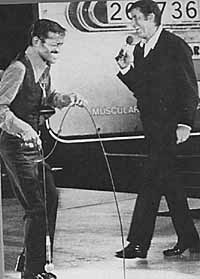https://www.austinchronicle.com/screens/1999-04-23/521847/
Scanlines
Romance on the High Seas
April 23, 1999, Screens
with Doris Day, Jack Carson, Janis Paige, Don DeFore, Oscar Levant, S. Z. Sakall, Eric Blore.
Years ago, while casually watching this film very late one night, I was stunned. Doris Day, having romantic problems, goes into the ship's bar, orders a drink, and begins to sing. Her performance opened me up to Day. I had already been through the two basic Doris Day stages experienced by my generation. As a kid, there was nothing more fun than going with the family to see Day in The Pajama Game (1957) with John Raitt (Bonnie's dad) or That Touch of Mink (1962) with Cary Grant. We especially loved the collaborative relationships, the Day/Rock Hudson films -- Pillow Talk (1959), Lover Come Back (1962), and Send Me No Flowers (1964) -- and the Day/ James Garner ones -- The Thrill of It All (1963) and Move Over, Darling (1963). Later, I came to hate Day. Seeing her as the epitome of Hollywood's vision of sexless suburban conformity, I thought she was the Harriet Nelson of the big screen. Watching Romance opened my eyes. As Groucho Marx once said, "I knew Doris Day before she was a virgin." It's not that she's a vamp here, there's just an undeniable sexiness and intensity. I spent a couple of decades, after this revelation, rewatching Day (as she was beginning to be rediscovered by feminist critics, including a 1980 British Film Institute dossier, Move Over Misconceptions: Doris Day Reappraised). Her later work resonated differently; I realized she was more in control, more powerful, more on her own. I came to appreciate the body of her work, the contradictions and tensions in her films that enrich the humor. Romance is the more simple beginning. Trust me, the charms here are gentle. Day is on a ship traveling toward Rio, pretending to be someone she isn't. The ship stops at port after port, each one offering up a "native" song and dance number. The great, sleazy Carson is a detective following the woman Day is pretending to be while, of course, falling in love with her. This is a delightful product of the old studio system, with top-notch talent working on what is, essentially, a programmer. Directed by Michael Curtiz (Casablanca, Mildred Pierce, White Christmas, King Creole) and written by Julius J. Epstein and Philip G. Epstein (the brothers responsible for Casablanca), it was first offered to Judy Garland. When she couldn't do it they offered it to Betty Hutton, who turned out to be pregnant. An unknown Doris Day wowed the crowd at a party given by Jule Styne and the rest is the Doris Day story. In prepping to watch the later Day films, I recommend any of the early Day/Warner Bros. films, especially It's a Great Feeling, a self-reflexive film about studio filmmaking whose starting premise is that no director on the Warners lot is willing to work with Jack Carson. Romance is just a beginning, but it offers stylish Day in a fresh and engaging film with a cast chock-full of great character actors. --Louis Black
Disorderly Orderly
D: Frank Tashlin (1964)
with Jerry Lewis, Glenda Farrell, Susan Oliver, Everett Sloane, Jack E. Leonard.
|
|
This time Lewis plays an orderly at a mental hospital. Perhaps because it was directed by Tashlin, the film is a bit more controlled than the more maudlin Lewis (though it does have some almost unbearable scenes). If you love Lewis' work, this piece is pointless. If you've always wondered what it was about him that sent the French into ecstasy and the loyal fan screaming, check out The Fat Jack sequence here. Famous comic Crazy Fat Jack (Leonard) is coming to the hospital and Lewis is so thrilled, he's explosively coming apart verbally and physically. If it leaves you cold, venture no further into Lewis land -- what you think is true. But, if against all your better instincts, you're laughing out loud, there is a lot more Lewis ready to come your way. As an added bonus, the title tune is sung by Jerry's great friend, Sammy Davis Jr. Hey, laaady! --Louis Black
Copyright © 2024 Austin Chronicle Corporation. All rights reserved.

